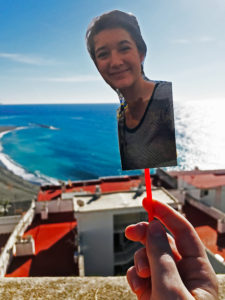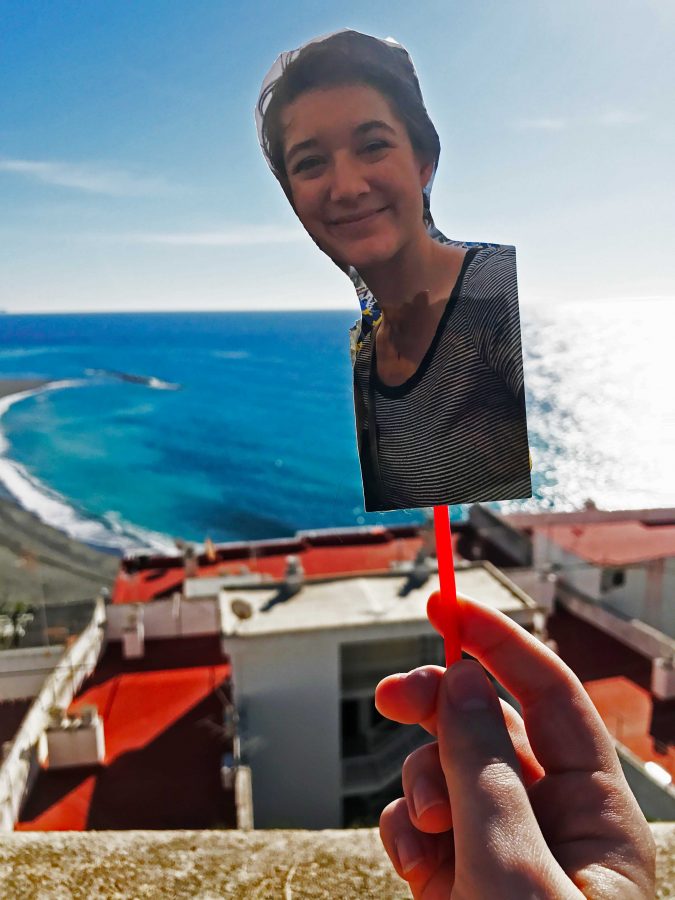
By Cat Swindal
This past week, I spent five days in Morocco on a study-abroad program. The architecture was incredible, with buildings and ancient ruins older than anything I had ever seen. I got to ride a camel and it wasn’t even Hump Day (and thus concludes my only joke in this piece).
I had a lot of great times in Morocco, but for this week’s column, I am focusing on an unfortunate event that occurred there, which, and I want to say this up-front, does not reflect on how I feel about the beautiful country and its people as a whole.
I first will contextualize this article with one of my best memories in Morocco. Three days into my trip, our group met with students from Rabat and had a round-table discussion about different topics pertaining to life in Morocco and the U.S. We were told by our tour guide that no topic was off-limits.
So when the topic of “homosexuality” came up, I held my breath. I had been curious about what it was like Morocco, and though I am out-and-proud in the U.S., I was nervous to even speak about it at all here, let alone ask a question about it.
The Moroccan students’ dialogue on the LGBT community surprised me in the best ways. Part of the answer was not surprising: yes, homosexuality is outlawed in Morocco and people can, and have, gone to jail for homosexual acts.
Most LGBT Moroccans are not out to their families, especially not to their parents. However, the students said their LGBT friends have the space to be who they are among their chosen people, that they themselves had queer friends who they support and love and allow to be themselves.
This really moved me, and I thought back on those whom I trust to allow me to be myself. I raised my hand and thanked them for their support of their friends and told them how much that meant to me.
After the discussion, two of the Moroccan students asked to see pictures of me and my girlfriend and told me they loved my buzzcut. They even wanted to take a picture with what I’ve dubbed “Amy on a Stick”, which is just a picture of my girlfriend on an old plastic paint brush with which I take pictures. I was beaming with pride, as my community and world growing a little more.
But then, hours later, I was hit by some of the worst homophobia I have ever experienced when another student I met later in the day harassed me after finding out I have a girlfriend.
I won’t mince words: it was gross. I felt so disgusted with myself to a point that I had to remind myself that I was not at fault. It was all I could think about for days and I couldn’t get back that pleasant feeling from the round-table discussion.
Since then, I have opened up to a few people on the trip about what happened, including my tour guide, who said that the student would be spoken to and will not be invited back next year.
Though the words of my family and friends comforted me, something still felt wrong, like the student’s ridicule latched onto my being. That, combined with being diagnosed with a bacterial infection shortly after returning to Granada, has made my life pretty miserable for the past week.
And then, my host mom, Conchi, helped me turn everything around.
One afternoon I came home from class, exhausted with an unrelenting stomachache. Conchi entered my room as soon as I came home and told me I needed to clean up (I’m kind of a slob, admittedly). I’m not sure why, but this caused me to start crying. I felt inadequate, since I didn’t keep my room up to par. Conchi, who knew I was sick, was very patient with me and helped me to reorganize things, and then left me alone; where I just laid down on my bed and continued to sob.
A couple minutes later, Conchi reemerged, sat down on my roommate’s bed, and asked me if there was anything else on my mind, if anything else had been bothering me. Surprising myself, I sat up and told her what happened in Morocco. And Conchi’s response, which I am going to translate best I can into English, was to let this one go. This student didn’t know anything about me, and probably didn’t know much about the LGBT community.
I was never going to see that person again. If my friend or my sibling or someone close to me had done something like that, it would be something to cry over. But the action of this person with the mind of, in her words, a mosquito, was not worth a second thought. Taking “Amy on a Stick” in her hand, Conchi pointed at the picture and said this person, whom you love, is whom you should be thinking about, and how happy she makes you. Not this mosquito brain.
And after absorbing what Conchi was saying, I stopped crying and began to laugh at the image of Conchi and “Amy on a Stick.” I listened to Conchi’s kind words for a long time and she gave me three hugs before leaving the room.
After this conversation, I quickly walked away from that situation in Morocco. I now acknowledge that it happened, and I have moved on. I wondered from where Conchi’s wisdom had stemmed, and with some thinking, I realized that I am so accustomed to American, individualist culture; this person hurt me on an individual basis. But conversely, I should see myself as connected to those I love and disconnected from those who don’t know me and hurt me in their ignorance.
Just like the LGBT friends of those wonderful people I met in Morocco, I too am able to thrive and help others to thrive because of the connected community of people in my life, both those who identify as LGBT and those who identify as allies.
I hope that the student who harassed me someday finds their own way into their own community where they can learn how to love people who are different from them. While they work on that, I am grateful for my family, my friends, my Amy and my new Spanish mama.
And the global LGBT community, including LGBT Moroccans, has a special place in my heart now more than ever. I am but one five-foot-two-inch queer 20-year-old American with a buzzcut, but to those who help me and others feel more themselves worldwide: thank you, thank you, thank you.







































































































































































































